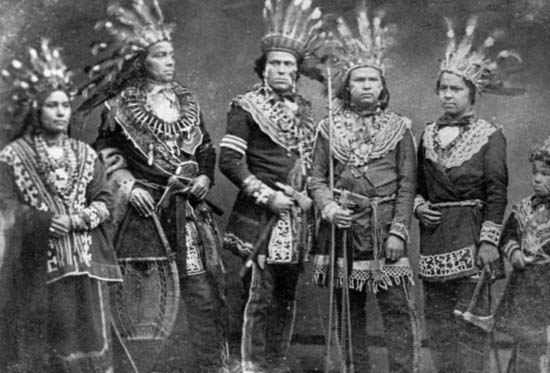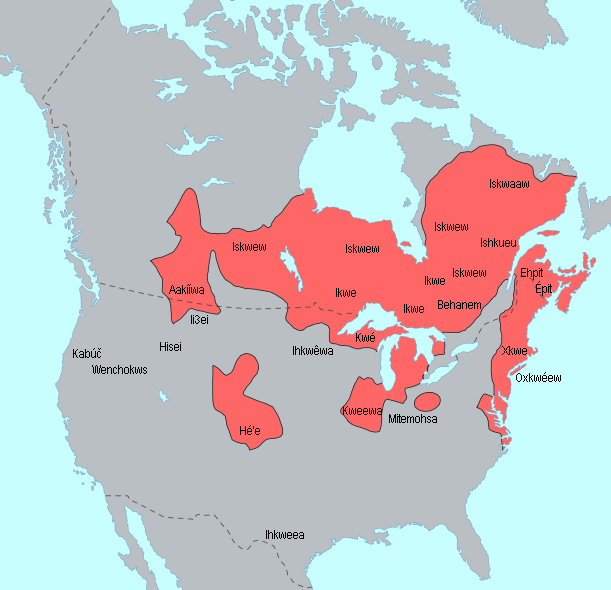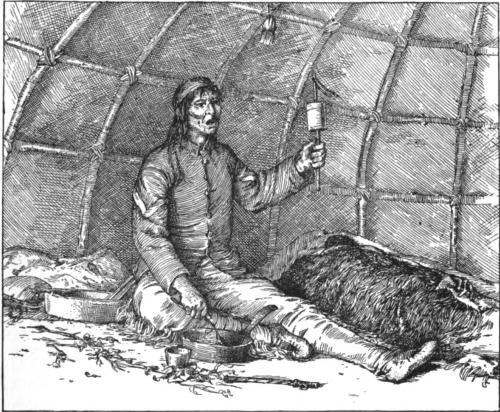|
Ojibwe
The Ojibwe, Ojibwa, Chippewa, or Saulteaux are an Anishinaabe people in what is currently southern Canada, the northern Midwestern United States, and Northern Plains. According to the U.S. census, in the United States Ojibwe people are one of the largest tribal populations among Native American peoples. In Canada, they are the second-largest First Nations population, surpassed only by the Cree. They are one of the most numerous Indigenous Peoples north of the Rio Grande. The Ojibwe population is approximately 320,000 people, with 170,742 living in the United States , and approximately 160,000 living in Canada. In the United States, there are 77,940 mainline Ojibwe; 76,760 Saulteaux; and 8,770 Mississauga, organized in 125 bands. In Canada, they live from western Quebec to eastern British Columbia. The Ojibwe language is Anishinaabemowin, a branch of the Algonquian language family. They are part of the Council of Three Fires (which also include the Odawa and Potawatomi) and ... [...More Info...] [...Related Items...] OR: [Wikipedia] [Google] [Baidu] |
Ojibwe Language
Ojibwe , also known as Ojibwa , Ojibway, Otchipwe,R. R. Bishop Baraga, 1878''A Theoretical and Practical Grammar of the Otchipwe Language''/ref> Ojibwemowin, or Anishinaabemowin, is an indigenous language of North America of the Algonquian language family.Goddard, Ives, 1979.Bloomfield, Leonard, 1958. The language is characterized by a series of dialects that have local names and frequently local writing systems. There is no single dialect that is considered the most prestigious or most prominent, and no standard writing system that covers all dialects. Dialects of Ojibwemowin are spoken in Canada, from southwestern Quebec, through Ontario, Manitoba and parts of Saskatchewan, with outlying communities in Alberta;Nichols, John, 1980, pp. 1–2. and in the United States, from Michigan to Wisconsin and Minnesota, with a number of communities in North Dakota and Montana, as well as groups that removed to Kansas and Oklahoma during the Indian Removal period. While there is some var ... [...More Info...] [...Related Items...] OR: [Wikipedia] [Google] [Baidu] |
Anishinaabe
The Anishinaabeg (adjectival: Anishinaabe) are a group of culturally related Indigenous peoples present in the Great Lakes region of Canada and the United States. They include the Ojibwe (including Saulteaux and Oji-Cree), Odawa, Potawatomi, Mississaugas, Nipissing and Algonquin peoples. The Anishinaabe speak ''Anishinaabemowin'', or Anishinaabe languages that belong to the Algonquian language family. At the time of first contact with Europeans they lived in the Northeast Woodlands and Subarctic, and some have since spread to the Great Plains. The word Anishinaabe translates to "people from whence lowered". Another definition refers to "the good humans", meaning those who are on the right road or path given to them by the Creator Gitche Manitou, or Great Spirit. Basil Johnston, an Ojibwe historian, linguist, and author wrote that the term's literal translation is "Beings Made Out of Nothing" or "Spontaneous Beings". The Anishinaabe believe that their people were created ... [...More Info...] [...Related Items...] OR: [Wikipedia] [Google] [Baidu] |
Odawa People
The Odawa (also Ottawa or Odaawaa ), said to mean "traders", are an Indigenous American ethnic group who primarily inhabit land in the Eastern Woodlands region, commonly known as the northeastern United States and southeastern Canada. They have long had territory that crosses the current border between the two countries, and they are federally recognized as Native American tribes in the United States and have numerous recognized First Nations bands in Canada. They are one of the Anishinaabeg, related to but distinct from the Ojibwe and Potawatomi peoples. After migrating from the East Coast in ancient times, they settled on Manitoulin Island, near the northern shores of Lake Huron, and the Bruce Peninsula in the present-day province of Ontario, Canada. They considered this their original homeland. After the 17th century, they also settled along the Ottawa River, and in the present-day states of Michigan and Wisconsin, as well as through the Midwest south of the Great Lakes ... [...More Info...] [...Related Items...] OR: [Wikipedia] [Google] [Baidu] |
Saulteaux
The Saulteaux (pronounced , or in imitation of the French pronunciation , also written Salteaux, Saulteau and other variants), otherwise known as the Plains Ojibwe, are a First Nations band government in Ontario, Manitoba, Saskatchewan, Alberta and British Columbia, Canada. They are a branch of the Ojibwe who pushed west. They formed a mixed culture of woodlands and plains Indigenous customs and traditions. Ethnic classification The Saulteaux are a branch of the Ojibwe Nations within Canada. They are sometimes called the Anihšināpē (Anishinaabe). ''Saulteaux'' is a French term meaning "people of the rapids," referring to their former location in the area of Sault Ste. Marie. They are primarily hunters and fishers, and when still the primary dwellers of their sovereign land, they had extensive trading relations with the French, British and later Americans at that post. Location The Saulteaux historically were settled around Lake Superior and Lake Winnipeg, principal ... [...More Info...] [...Related Items...] OR: [Wikipedia] [Google] [Baidu] |
Minnesota
Minnesota () is a state in the upper midwestern region of the United States. It is the 12th largest U.S. state in area and the 22nd most populous, with over 5.75 million residents. Minnesota is home to western prairies, now given over to intensive agriculture; deciduous forests in the southeast, now partially cleared, farmed, and settled; and the less populated North Woods, used for mining, forestry, and recreation. Roughly a third of the state is covered in forests, and it is known as the "Land of 10,000 Lakes" for having over 14,000 bodies of fresh water of at least ten acres. More than 60% of Minnesotans live in the Minneapolis–Saint Paul metropolitan area, known as the "Twin Cities", the state's main political, economic, and cultural hub. With a population of about 3.7 million, the Twin Cities is the 16th largest metropolitan area in the U.S. Other minor metropolitan and micropolitan statistical areas in the state include Duluth, Mankato, Moorhead, Rochester, and ... [...More Info...] [...Related Items...] OR: [Wikipedia] [Google] [Baidu] |
Council Of Three Fires
The Council of Three Fires (in oj, label=Anishinaabe, Niswi-mishkodewinan, also known as the People of the Three Fires; the Three Fires Confederacy; or the United Nations of Chippewa, Ottawa, and Potawatomi Indians) is a long-standing Anishinaabe alliance of the Ojibwe (or Chippewa), Odawa (or Ottawa), and Potawatomi North American Native tribes. History Originally one people, or a collection of closely related bands, the ethnic identities of Ojibwe, Odawa, and Potawatomi developed after the Anishinaabe reached Michilimackinac on their journey westward from the Atlantic coast. Using the Midewiwin scrolls, Potawatomi elder Shup-Shewana dated the formation of the Council of Three Fires to 796 AD at Michilimackinac. In this Council, the Ojibwe were addressed as the "Older Brother," the Odawa as the "Middle Brother," and the Potawatomi as the "Younger Brother." Consequently, whenever the three Anishinaabe nations are mentioned in this specific ''and'' consecutive order of Ojib ... [...More Info...] [...Related Items...] OR: [Wikipedia] [Google] [Baidu] |
Michigan
Michigan () is a state in the Great Lakes region of the upper Midwestern United States. With a population of nearly 10.12 million and an area of nearly , Michigan is the 10th-largest state by population, the 11th-largest by area, and the largest by area east of the Mississippi River.''i.e.'', including water that is part of state territory. Georgia is the largest state by land area alone east of the Mississippi and Michigan the second-largest. Its capital is Lansing, and its largest city is Detroit. Metro Detroit is among the nation's most populous and largest metropolitan economies. Its name derives from a gallicized variant of the original Ojibwe word (), meaning "large water" or "large lake". Michigan consists of two peninsulas. The Lower Peninsula resembles the shape of a mitten, and comprises a majority of the state's land area. The Upper Peninsula (often called "the U.P.") is separated from the Lower Peninsula by the Straits of Mackinac, a channel that joins Lak ... [...More Info...] [...Related Items...] OR: [Wikipedia] [Google] [Baidu] |
Algonquian Languages
The Algonquian languages ( or ; also Algonkian) are a subfamily of Indigenous languages of the Americas, indigenous American languages that include most languages in the Algic languages, Algic language family. The name of the Algonquian language family is distinguished from the orthographically similar Algonquin language, Algonquin dialect of the Indigenous Ojibwe language (Chippewa), which is a senior member of the Algonquian language family. The term ''Algonquin'' has been suggested to derive from the Maliseet word (), "they are our relatives/allies". A number of Algonquian languages are considered extinct languages by the modern linguistic definition. Algonquian peoples, Speakers of Algonquian languages stretch from the east coast of North America to the Rocky Mountains. The proto-language from which all of the languages of the family descend, Proto-Algonquian language, Proto-Algonquian, was spoken around 2,500 to 3,000 years ago. There is no scholarly consensus about wh ... [...More Info...] [...Related Items...] OR: [Wikipedia] [Google] [Baidu] |
Midewiwin
The Midewiwin (in syllabics: , also spelled ''Midewin'' and ''Medewiwin'') or the Grand Medicine Society is a secretive religion of some of the indigenous peoples of the Maritimes, New England and Great Lakes regions in North America. Its practitioners are called ''Midew'', and the practices of ''Midewiwin'' are referred to as ''Mide''. Occasionally, male ''Midew'' are called ''Midewinini'', which is sometimes translated into English as "medicine man". Etymology The preverb ''mide'' can be translated as "mystery," "mysterious," "spiritual," "sanctified," "sacred," or "ceremonial", depending on the context of its use. The derived verb ''midewi'', thus means "be in/of ''mide''." The derived noun ''midewiwin'' then means "state of being in ''midewi''." Often ''mide'' is translated into English as "medicine" (thus the term ''midewinini'' "medicine-man") though ''mide'' conveys the idea of a spiritual medicine, opposed to ''mashkiki'' that conveys the idea of a physical medicine. ... [...More Info...] [...Related Items...] OR: [Wikipedia] [Google] [Baidu] |
Algonquian Peoples
The Algonquian are one of the most populous and widespread North American native language groups. Historically, the peoples were prominent along the Atlantic Coast and into the interior along the Saint Lawrence River and around the Great Lakes. This grouping consists of the peoples who speak Algonquian languages. Before Europeans came into contact, most Algonquian settlements lived by hunting and fishing, although quite a few supplemented their diet by cultivating corn, beans and squash (the " Three Sisters"). The Ojibwe cultivated wild rice. Colonial period At the time of the first European settlements in North America, Algonquian peoples occupied what is now New Brunswick, and much of what is now Canada east of the Rocky Mountains; what is now New England, New Jersey, southeastern New York, Delaware and down the Atlantic Coast through the Upper South; and around the Great Lakes in present-day Minnesota, Wisconsin, Michigan, Illinois, Indiana and Iowa. The homeland of the A ... [...More Info...] [...Related Items...] OR: [Wikipedia] [Google] [Baidu] |
Potawatomi
The Potawatomi , also spelled Pottawatomi and Pottawatomie (among many variations), are a Native American people of the western Great Lakes region, upper Mississippi River and Great Plains. They traditionally speak the Potawatomi language, a member of the Algonquin family. The Potawatomi call themselves ''Neshnabé'', a cognate of the word ''Anishinaabe''. The Potawatomi are part of a long-term alliance, called the Council of Three Fires, with the Ojibway and Odawa (Ottawa). In the Council of Three Fires, the Potawatomi are considered the "youngest brother" and are referred to in this context as ''Bodwéwadmi'', a name that means "keepers of the fire" and refers to the council fire of three peoples. In the 18th century, they were pushed to the west by European/American encroachment and eventually removed from their lands in the Great Lakes region to reservations in Oklahoma. Under Indian Removal, they eventually ceded many of their lands, and most of the Potawatomi relocated ... [...More Info...] [...Related Items...] OR: [Wikipedia] [Google] [Baidu] |
First Nations In Canada
First Nations (french: Premières Nations) is a term used to identify those Indigenous Canadian peoples who are neither Inuit nor Métis. Traditionally, First Nations in Canada were peoples who lived south of the tree line, and mainly south of the Arctic Circle. There are 634 recognized First Nations governments or bands across Canada. Roughly half are located in the provinces of Ontario and British Columbia. Under Charter jurisprudence, First Nations are a "designated group," along with women, visible minorities, and people with physical or mental disabilities. First Nations are not defined as a visible minority by the criteria of Statistics Canada. North American indigenous peoples have cultures spanning thousands of years. Some of their oral traditions accurately describe historical events, such as the Cascadia earthquake of 1700 and the 18th-century Tseax Cone eruption. Written records began with the arrival of European explorers and colonists during the Age of Dis ... [...More Info...] [...Related Items...] OR: [Wikipedia] [Google] [Baidu] |


.jpg)



